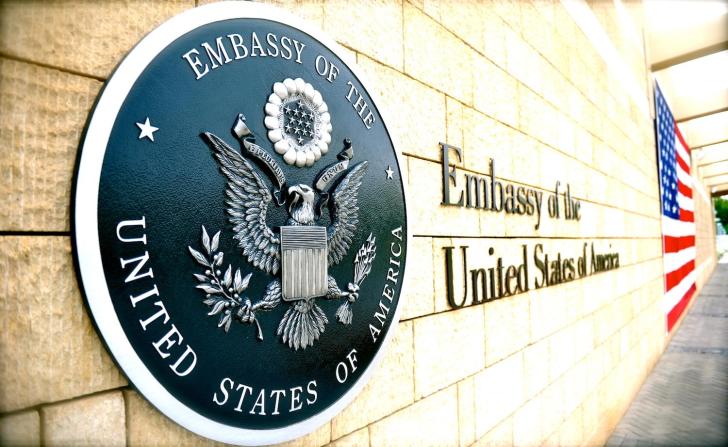News / National
US Embassy pauses regime change funding in Zimbabwe?
05 Feb 2025 at 20:13hrs |
0 Views

The United States Embassy in Zimbabwe has announced a comprehensive review of all funds released to the country through the State Department and USAID, in line with President Donald Trump's "America First" policy. The policy, unveiled during Trump's inauguration, emphasizes "reasonable use of taxpayer money" and prioritizes the development of the United States over foreign aid.
As a result, millions of dollars in funding for Zimbabwean civil society organizations (CSOs) and billions globally have been paused, sparking widespread concern over the impact on Zimbabwe's critical health and education sectors. However, a waiver for health-related funding was later announced, after fears arose that Africa's under-resourced health systems could collapse without U.S. support.
In a statement released Wednesday, the U.S. Embassy clarified that foreign assistance programs are being reviewed to ensure alignment with America's new foreign policy priorities.
"The review of all foreign assistance programs will ensure they are efficient and consistent with U.S. foreign policy under the America First agenda," read the statement.
"The US Embassy in Zimbabwe has paused its foreign assistance and is reviewing its programs to bring them in line with this Executive Order and the waiver."
Despite the pause, the embassy highlighted the significant contributions the U.S. has made to Zimbabwe's development.
"Today, 1.2 million Zimbabweans live longer, healthier lives because of PEPFAR's support for HIS services. Over 1,600 public hospitals and clinics have benefited from training and technical support from the United States," the statement added.
The U.S. is the largest donor to Zimbabwe's health sector, financing essential services in the fight against sexually transmitted infections and HIV. Through PEPFAR, the U.S. provides antiretroviral drugs (ARVs) and condoms, which are distributed across local hospitals and clinics.
Humanitarian assistance has also played a critical role in addressing food insecurity caused by the El Nino-induced drought, with more than 500,000 Zimbabweans benefiting from U.S. support.
While the waiver on health-related funding provides temporary relief, the review of other aid programs has raised concerns about the future of U.S. assistance in Zimbabwe. The potential reduction in funding could significantly affect civil society organizations and development projects across the country.
As Zimbabwe relies heavily on foreign aid to sustain its public services, the U.S. funding review is likely to have far-reaching consequences, prompting calls for the government to strengthen its own capacity to address national challenges.
As a result, millions of dollars in funding for Zimbabwean civil society organizations (CSOs) and billions globally have been paused, sparking widespread concern over the impact on Zimbabwe's critical health and education sectors. However, a waiver for health-related funding was later announced, after fears arose that Africa's under-resourced health systems could collapse without U.S. support.
In a statement released Wednesday, the U.S. Embassy clarified that foreign assistance programs are being reviewed to ensure alignment with America's new foreign policy priorities.
"The review of all foreign assistance programs will ensure they are efficient and consistent with U.S. foreign policy under the America First agenda," read the statement.
"The US Embassy in Zimbabwe has paused its foreign assistance and is reviewing its programs to bring them in line with this Executive Order and the waiver."
Despite the pause, the embassy highlighted the significant contributions the U.S. has made to Zimbabwe's development.
"Today, 1.2 million Zimbabweans live longer, healthier lives because of PEPFAR's support for HIS services. Over 1,600 public hospitals and clinics have benefited from training and technical support from the United States," the statement added.
The U.S. is the largest donor to Zimbabwe's health sector, financing essential services in the fight against sexually transmitted infections and HIV. Through PEPFAR, the U.S. provides antiretroviral drugs (ARVs) and condoms, which are distributed across local hospitals and clinics.
Humanitarian assistance has also played a critical role in addressing food insecurity caused by the El Nino-induced drought, with more than 500,000 Zimbabweans benefiting from U.S. support.
While the waiver on health-related funding provides temporary relief, the review of other aid programs has raised concerns about the future of U.S. assistance in Zimbabwe. The potential reduction in funding could significantly affect civil society organizations and development projects across the country.
As Zimbabwe relies heavily on foreign aid to sustain its public services, the U.S. funding review is likely to have far-reaching consequences, prompting calls for the government to strengthen its own capacity to address national challenges.
Source - newzimbabwe
Join the discussion
Loading comments…





































